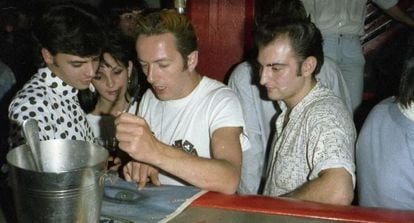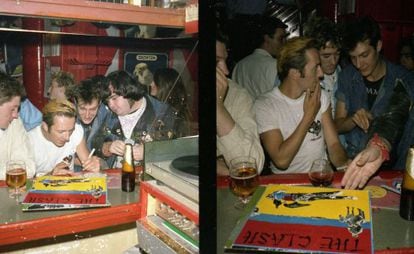Dude, where’s my car?
In 1986, Joe Strummer managed to lose his Dodge 3700 GT somewhere in Madrid A new documentary traces the time the former singer from The Clash spent in the capital

It could happen to anybody: you go out for the evening, park your car, and then forget where you left it. But if you’re English and don’t know Madrid very well, then you might be in trouble. And if you’re an international rock star running from your past with your head full of problems, you’re even less likely to find your car.
This is pretty much what happened to Joe Strummer, lead singer with punk bank The Clash, during the couple of months he lived in the Spanish capital in 1986. The story has now been told in I Need a Dodge, a documentary by Barcelona-based British filmmaker Nick Hall. “I always wanted to make a film about Joe Strummer, because I love The Clash, and the car provided a good way in,” he explains.
Hall says the idea came to him when he was listening to a live broadcast from the Glastonbury Festival in 1997, during which Joe Srummer made an appeal to listeners in Spain asking for help finding his Dodge 3700 GT. He died 12 years later without ever finding the vehicle.
I always wanted to make a film about Joe Strummer, and the car provided a way in”
Strummer had come to Spain in 1986 after he had thrown fellow founder member of The Clash, Mick Jones, out of the band. “He was a kind of living legend, but not doing anything musically, and that was his big mistake,” says Santiago Auserón, lead singer with Radio Futura, one of the biggest bands in 1980s Spain. “Joe fled London for Granada to try to get away from it all: he had a female friend living there that he had known in London in the seventies, before The Clash,” says Auserón, who got to know Strummer well during his time in Spain. Strummer became familiar with a group in Granada called 091, and suggested producing a record for them. This brought him to Madrid, where he stayed for several months, and got to know Radio Futura, immersing himself in Madrid’s vibrant nightlife.
“Joe wanted to prove something by recording with 091. He thought that he could make them international stars,” says Nick Hall, explaining that things didn’t quite work out like that.
“He wanted to do things the English way, take his time, spend money on it, but the record company wasn’t prepared to pay,” says Auserón. During the recording, Strummer was out every night, says Auserón. “We shared a flat with my brother, but he was always out, sometimes he slept in the studio.”

Nevertheless, the two musicians spent a lot of time together, often into the early hours one of the many bars in Madrid’s Malasaña district, such as King Criole, now closed, where the disc jockey, Ely Agramunt, would play music from New Orleans. It was Agramunt who gave Hall the first clues on the trail of the Dodge.
He was with Strummer the night he parked the car for the last time. The next day, Strummer was traveling to London, where his wife was due to give birth. He left behind an unfinished record, and his car. “When he returned a bit later, he couldn’t remember where he’d left it, and Agramunt was nowhere to be found either,” says Hall. The car was almost certainly towed away, and left to rot in a police compound somewhere in the Spanish capital.
Did Nick Hall ever find the Dodge? The filmmaker says that his film isn’t really about the car: “It’s an opportunity to look at an important time for Joe: between the end of The Clash, and the rest of his life.”










































